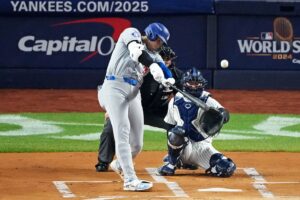Baseball is a numbers game. It always has been. From batting average on the back of a 1956 Mickey Mantle baseball card to the overflow of numbers that go into calculating defensive UZR and WRC+ in today’s landscape. Baseball will never be able to escape its quantitative nature.
This brings up the main point in this discussion: Barry Bonds, the player that put up the greatest numbers the game has ever seen, is not in the hall of fame. Many know him as the skinny outfielder, with a major league pedigree, who began his career with the Pittsburgh Pirates before becoming a bulky offensive juggernaut with the San Francisco Giants.
Making the Case: Barry Bonds and the 2018 Hall of Fame Ballot
He, or rather a chemically enhanced version of himself, broke the most hallowed record in all of sports. He was brash and conceited, so he made for the perfect villain. His 762 homers, seven NL MVP trophies and eight Gold Gloves would normally be a recipe for induction on the first ballot. However, sorting out the accomplishments, the era and the ego have proven somewhat difficult for the electorate. In the spirit of the game, looking at the numbers in context may provide a clear picture of his hall-of-fame candidacy.
Wins Above Replacement
Not an easy thing to do in baseball, so much so that some criticize the application, Wins Above Replacement (WAR) attempts to quantify a player’s value into a single number. According to Baseball Reference, WAR is “a single number that presents the number of wins the player added to the team above what a replacement player would add.”
That being said, Bonds is second all-time in career WAR among position players behind Babe Ruth, according to BR. On top of that, he’s the only non-hall-of-famer among the top 11. He ranks ahead of names like Ty Cobb, Hank Aaron and his godfather Willie Mays.
Pirates through 1998
Known for his statistical success with the Giants, Bonds won two of his seven NL MVPs as a member of the Pirates during the first part of his career. From 1990-93 he finished in the top two all four years, winning three.
Calling him a five-tool player back then was a stretch. His arm in left field left much to be desired. His game was pretty much relegated to hitting, stealing bags and catching the ball. Bonds won the first of his five-consecutive Gold Gloves in 1990, while hitting at least 20 homers and stealing 20 bags in four of his seven seasons in Pittsburgh. He was certainly the key component of the competitive Pirates teams in the early 1990s.
By the time he became a free agent after the 1992 season, he was widely considered the best in the game. After signing with his father and godfather’s team as a free agent, he began his career in San Francisco with a bang. Bonds won the 1993 NL MVP, leading the league in homers, RBI, OBP and OPS. He was named an NL All-Star every year between 1992-1998.
2001-2004
There is a lot to unwrap here. Simply put, this is the greatest four-year stretch a hitter will ever see in Major League Baseball history.
Bonds averaged .349, 52 homers, a .558 OBP, a .806 slugging percentage, 189 walks and a 255 OPS+. That is a .349/.558/.806 slash line over four seasons. Most focus on the 73 homers in 2001, but the most absurd statistics came in 2004 with a .609 OBP and 1.422 OPS, along with 232 walks (120 intentional) during that same year.
Teams did whatever they could to pitch around Bonds in 2004. It was legitimate fear. The fact that the hitters around him in the order usually included J.T. Snow and Marquis Grissom didn’t help him much in that regard. He would generally get one pitch to hit a night, if he was lucky – and he usually barreled it. At the end of that season he captured his fourth-consecutive NL MVP award and seventh overall.
The Asterisk Era
“I had a helluva [sic] season last year, and nobody gave a crap. Nobody,” Bonds reportedly told Ken Griffey, Jr. in Jeff Pearlman’s book Love Me, Hate Me: Barry Bonds and the Making of an Antihero following the 1998 season. “As much as I’ve complained about McGwire and Canseco and all of the bull with steroids, I’m tired of fighting it. I turn 35 this year. I’ve got three or four good seasons left, and I wanna [sic] get paid. I’m just gonna [sic] start using some hard-core stuff, and hopefully it won’t hurt my body. Then I’ll get out of the game and be done with it.”
The aforementioned numbers mean nothing without context. The best way to describe Bonds during the steroid era is that he was a walking (literally) hyperbole of the culture of the game at the time. If the above quote is true (which I have no reason to believe it isn’t, considering the author), watching Mark McGwire and Sammy Sosa chase Roger Maris’ record in 1998 exhausted him. All he managed to do was hit .303/.438/.609, hit his 400th career homer to become MLB’s first 400/400 player and win his eighth Gold Glove to little or no fanfare.
McGwire hit a bunch of homers, but only hit .300 in a season in which he played more than 100 games once. He was a career .263 hitter and struck out over 100 times in a season 10 times, all with the admitted use of performance enhancers. And don’t even get me started on how quick Sammy Sosa would have been released without the existence of PEDs.
Bonds witnessed poor and average players become above average and superstar players simply by using these drugs, and getting paid well for doing so. So, unfortunately, he decided that if this was the norm, he was going to cash in and do it better than everyone else – because he was better than everyone else.
Verdict
Now, cheating better than the other cheaters is quite the quandary. But the fact is that the National Baseball Hall of Fame is a museum. Omitting 1985-2005 from the game’s history would be akin to Germany erasing 1939-1945 from history books. The era may be a black eye on the game, but it’s still part of it.
Many don’t like the “he was a hall of famer before he cheated” argument, but that doesn’t make it less true. As he separated himself from great players before his body changed, he separated himself from the other PED users by absolutely obliterating their numbers. Saying “everyone was doing it” may not quite be the case, but denying it was widespread culture is ludicrous, which is why the term cheating could also use an asterisk here.
Keeping arguably one of the best five players out of the game because of the era in which he played would be a tragedy. Barry Bonds is a hall of famer. He might not get there in 2018, but he is a hall of famer.
Main Photo






